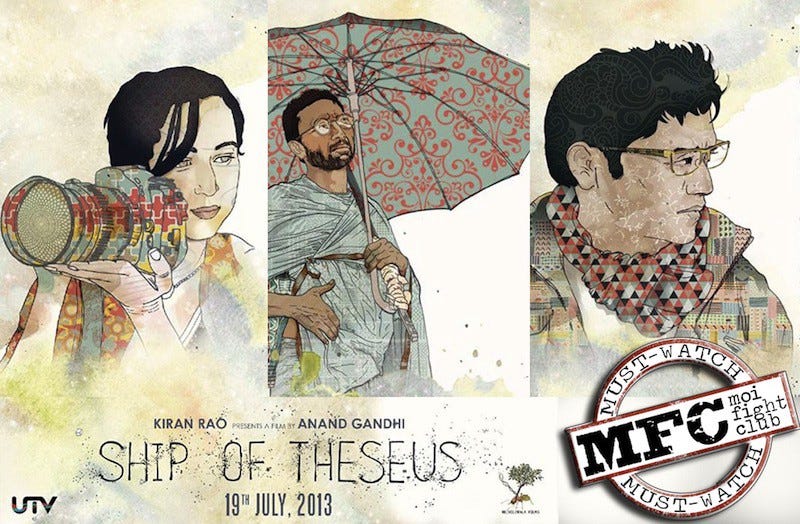Ship of Theseus — A landmark for Indian cinema
There are very few things in life which are complete or sequenced perfectly. Most situations end up having incomplete ends that are open…

There are very few things in life which are complete or sequenced perfectly. Most situations end up having incomplete ends that are open to multiple interpretations, leaving a feeling of having passed through a lot without actually feeling completely satiated.
‘Ship of Theseus’ works primarily because it portrays life as it is, with no explanations for each happening or no true conclusions either. You won’t laugh too hard, you won’t cry much either. The film won’t make your adrenaline rush. However, at the end, you’ll be left stunned and silent in a movie hall where people will struggle to move out of their seats and remain seated long into the titles — a sight I had only witnessed at the end of ‘Taare Zameen Par’ thus far.
The camera moves slowly, the picture quality is far from perfect, actors wear hardly any make up, there is more silence than dialogues, noise is used as a stimulant to make the viewer experience reality as closely as possible.
Aliya is a blind Middle-eastern girl married to an Indian boy in Bombay. More spirited than those with eyesight, she lives her life wholeheartedly, remarkably clicking and editing photos on the basis of sound and feel. After a successful operation, she is no longer blind. However, after regaining her eyesight, photography no longer means what it meant to her earlier.
Mahesh is an atheist monk walking all over Bombay barefoot. Having filed a Public Interest Litigation asking for better treatment of animals at pharmaceutical testing labs, Mahesh has made his life devoid of any act that he perceives as harmful to a living creature. However when he needs a liver transplant, after a lengthy struggle at a fast unto death, he eventually succumbs to having to consume medicines made by the same pharmaceutical companies.
Navin is the money obsessed grandson of a lady who believes in activism and the greater purpose of life. After repeated persuasion by her, he gets drawn to the pursuit of finding who his donor was in his recent kidney transplant operation. In the process, he comes across another case where a labourer (Shankar) was duped and his kidney stolen for a wealthy, Swedish recipient. Navin strives to help Shankar by visiting his recipient in Sweden and attempting to extract a moral realization of the wrong committed by him. When he is finally able to achieve that, Shankar backs out thanks to a newly developed greed for money.
The film’s concept and its title are based on the Theseus paradox which questions if all parts of a ship being replaced still leaves the ship as it was. The way the three stories converge in the end, beautifully represents the core concept of the film.
With outstanding all round performances and a truly revolutionary concept and execution, SOT is a landmark film and director Anand Gandhi deserves all the praise he is getting!
Don’t miss this one! You may not go crazy over it but it will be an experience.
4/5



